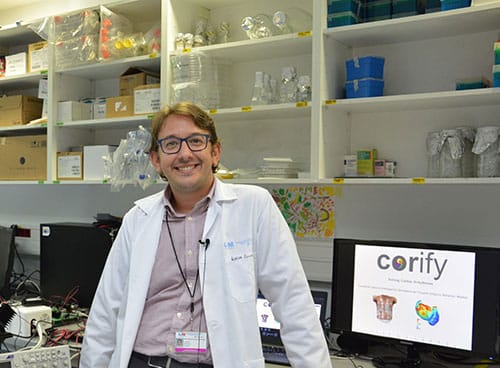Developing new technologies to help solve the most pressing issues in healthcare is the number one goal for any biomedical engineer, and Andreu Climent is no exception. He is the CEO of the Madrid-based medtech start-up, Corify Care, a spin-off from the Hospital Gregorio Marañon, and a former CaixaImpulse project. Now, he is well on his way to reaching this goal, with his company’s novel technology on track to enter the market by 2023.
Corify Care’s innovation aids the classification of disease severity for patients suffering from atrial fibrillation (AF). This serious heart condition can lead to a number of devastating consequences for patients, such as dramatically reducing life expectancy and increasing the risk of embolic stroke, heart failure and dementia. Until now, a one-size-fits-all approach has been applied to AF therapies, meaning that patients with differing variations of the disease may end up receiving treatments that are either too aggressive or ineffective for their condition
Andreu Climent identified this problem while working in the cardiology department of several different hospitals. “In all of the hospitals I’ve worked, clinicians have had common complaints regarding the inefficient flowchart of treatment of AF patients.” In order to address this, Corify Care’s novel technology classifies disease severity, thus facilitating the process of prescribing the appropriate treatment. For example, many patients who were not considered for aggressive ablation therapies, currently the most effective available, will now benefit from these treatments if Corify Care’s technology identifies their AF as simple.
Andreu describes CaixaImpulse 2017 as a fundamental step in the development of the project. The training received and contacts made through the programme enabled Corify Care to advance on the path towards commercialisation – which they now envision reaching by 2023.
He says that for him, the most important gain from CaixaImpulse was the change in perception. “Thanks to CaixaImpulse I was finally able to understand the process of jumping from a high impact journal to improving the quality of life of patients. It enabled us to predict the different death valleys and meet the people that could help us overcome them,” he comments. It has even changed his approach to basic research: “Now, even when we are in the earliest stages of a new line of research, we are already considering the questions that investors and regulatory would ask, and how we can adjust the experimental design to reduce the time to market.”
Corify is currently treating patients under proof of concept clinical trials – and highly promising preliminary results are already being reported. To date, more than 150 patients at Madrid’s Hospital Gregorio Marañon have been characterised using Corify technology. Andreu predicts that this technology will be helping millions of patients within the decade.
What’s next for Corify? “Thanks to the support of private investors, we are at the stage of jumping from prototype to a certifiable product.” To bolster this final developmental step, they are focusing on expanding their team, incorporating experts from such diverse backgrounds as investment, management, production, regulation and market access.

